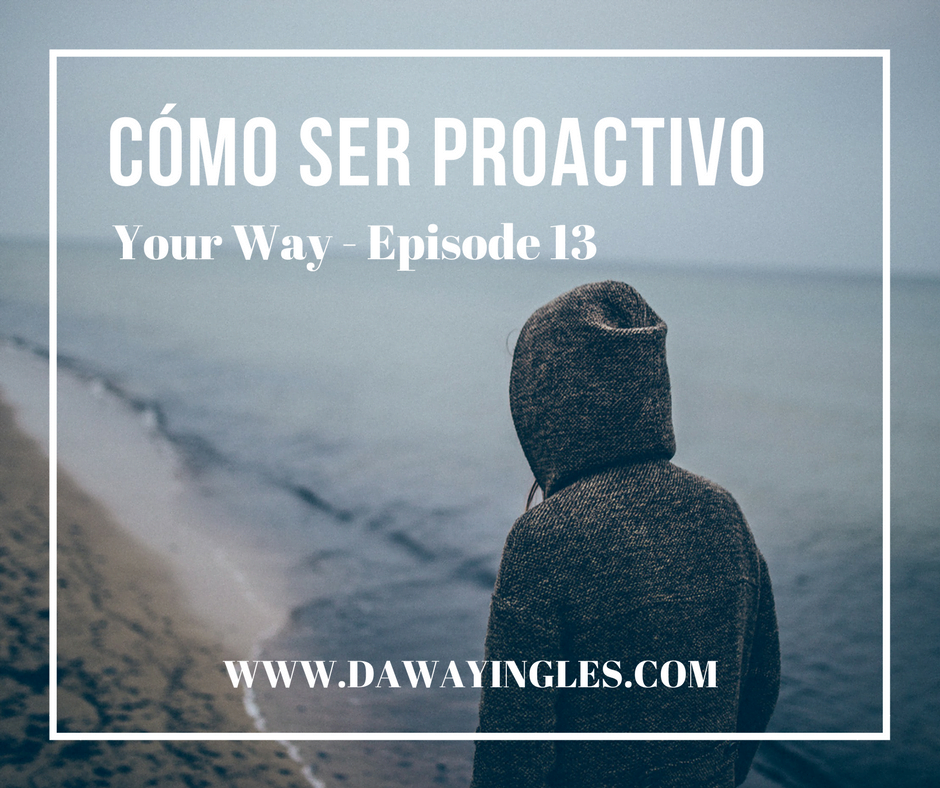
Cómo ser proactivo. How to be proactive, to take action and start getting energy and motivation out of life. That’s today’s episode about!
Welcome to Your Way, the podcast that helps you learn practical English! Today’s topic is quite interesting. ¡Cómo ser proactivo!
Have you ever found yourself lacking motivation and energy? ¿Te ha pasado alguna vez? Pierdes la motivación, las ganas de hacer cosas, de seguir adelante, y parece que no llegan, que tienes que esperar a que algo cambie para coger tu vida por las riendas. Ves posters e imágenes motivacionales, actualizaciones de Facebook y demás redes sociales, tipo Mr Wonderful “You have to be positive!”, “Follow your dreams”, etc y piensas….“well…that’s not reality, c’mon!”. La realidad es mucho más complicada que un par de frases positivas. True, right?
I have spoken about this a couple of times on the blog. It happens to me with such a lot of things. Sé que puede pasar con el inglés, con el curro, con cualquier meta que te pongas, o simplemente el día a día. It is difficult to get things done and be on top of everything, feeling great. Sin embargo, hay gente que parece un torrente de positivismo y ganas de comerse el mundo mientras que otros tienen más problemas para coger fuerzas. Have you noticed it too? La buena noticia es que puedes pasar del grupo 2 al 1 simplemente sabiendo un par de trucos “realistas” y práctica, práctica, práctica 🙂
Jessica Ramos, una alumna de Daway Tribe y mujer todoterreno donde las haya, realizó la encuesta del podcast y nos pidió que hablásemos de esto, de proactividad y pensamiento positivo, en inglés. And that’s what we have done! We discuss our personal experience with this topic, tell stories and share hacks you can use to improve your proactivity. Como siempre, Mónica y yo te ayudamos a aprender inglés práctico mientras charlamos y lo pasamos bien (tienes un montón de vocabulario y expresiones nativas en este episodio!).
Let’s do this!
Cómo ser proactivo – Your Way 13
Usa este enlace para descargar el podcast en formato mp3
Ideas mentioned in this podcast
– Question of the day (from Jessica Ramos): how to be more proactive and have a positive mind-set – 0:34
– Tip 01: the number one reason why positive thinking has a bad reputation. It takes energy and effort to put it into practice (it’s like a muscle). It is easier to destroy than to create something and we love shortcuts – 02:00
– Tip 02: the second biggest reason: there is always a price to pay. “Being happy” is not a product that you can buy. It’s a process and constant habit – 05:00
– Every story has a dark side or version and everyone fights his/her own battle. It is easy to just look at the surface of someone’s life – 07:00
– Tip 03: difficult things (learning a language, becoming an artist, running an ironman) take time and continued effort. It’s important to work smarter, not harder (find the activities that will give you the most results) – 12:53
– Tip 04: it’s impossible to control your life 100%. We are not as intelligent as we think we are. However, a realistic 50% depends entirely on you and your actions, decisions, etc – 15:30
– Tip 05: be honest with yourself and accept your part of responsibility. What you have is – in part – a result of your decisions, actions, etc – 16:53
– The meaning of the expression “The buck stops here”, popularised by U.S President Harry S. Truman – 24:05
– Tip 06: instead of waiting for motivation to come, decide to get in movement yourself and you will get momentum – 28:35
Vocabulary used in this episode
– Gimmicky: efectista, vendehumos
– To destroy something: destruir algo
– A blackout: un apagón
– Shit happens: qué putada, a veces ocurren putadas
– A shortcut: un atajo
– A product: un producto
– To succeed in doing something: tener éxito en algo, conseguir hacerlo
– The surface: la superficie
– To be hooked on something: estar enganchado/a a algo
– To be lucky / to get lucky: ser afortunado / tener suerte
– To make a comment: hacer un comentario
– To film / to shoot video: grabar vídeo
– To be jealous of someone: estar celoso/a de alguien
– To be a narcissist: ser narcisista
– To have a day off: tener/coger un día libre (del trabajo)
– To solve a problem: solucionar un problema
– To be in charge of something: estar a cargo, al mando de algo
– Pompous: pomposo
– Self-help: auto-ayuda
– Cheesy: hortera, pasteloso
– To fool yourself: engañarte a ti mismo/a
– A saying: un dicho
– To sit on the driver’s seat: coger tu vida por las riendas, hacerte responsible
– To criticise something: criticar algo
– You can’t have your cake and eat it: no se puede tener todo
– Randomness: el azar, aleatoriedad
– To blame someone for doing something: culpar a alguien de hacer algo
– The cost of living: el precio o coste de la vida
– Accommodation: alojamiento
– The rent: el alquiler, la renta
– It’s my fault: es mi culpa
– Everything BUT you / I have everything BUT tomato: todo excepto tú / tengo de todo menos tomate
– To speak in plain English: hablar en cristiano, llano, para que la gente te entienda
– To pass the buck: pasar el muerto, colgarle el marrón/problema a otra persona
– A buck: un dólar (pavo), billete americano / un ciervo macho
– The buck stops here: no puedes culpar a nadie más, es la última parada, tú eres el último responsable
– The blank page syndrome: syndrome de la página en blanco (bloqueo del escritor)
– Wishful thinking: idealismo pasivo, deseo sin ejecución
– Down-to-earth: con los pies en el suelo, realista (adjetivo)

